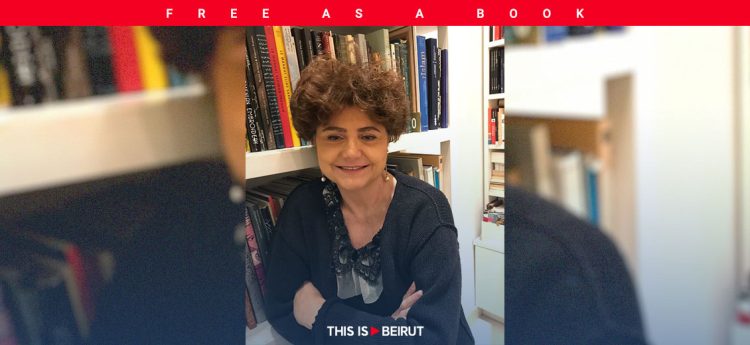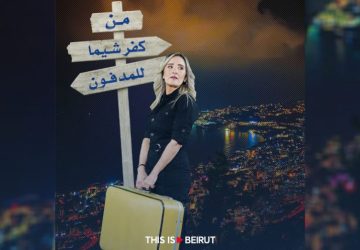Two years after the assassination of Lokman Slim, This is Beirut interviews his sister, Rasha al-Ameer, a distinguished writer and publisher, as well as the co-founder of Dar al-Jadeed. The interview delves into the challenges of seeking justice, hindered mourning, the power of writing, and the writer’s upcoming projects. Ameer, an iron fist in a velvet glove, gave a remarkable interview.
Listen to the article
After completing her higher studies in history and fine arts in Paris, Rasha Slim embarked on a career in journalism in the city. However, in an act of whimsy, and to distinguish herself from her family’s intellectual legacy, she adopted a pen name, Rasha al Ameer, and ventured into the world of writing. In 1990, she founded a publishing house, Dar al-Jadeed, together with her martyred brother, the linguist, journalist, and philologist Lokman Slim. The house focuses on prominent Arab writers, including bilingual writers.
Under the guidance of an imam and scholar, she underwent an initiation in theology, perfected her classical Arabic, and deepened her knowledge of the poetic works of the poet Al-Mutannabi. She wrote three books and translated two works. Her debut novel, The Last Day, Confession of an Imam (Yawm al-Din) was published by several Arabic publishing houses, including Dar al Jadeed, and was subsequently translated into French by Youssef Siddik and published by Sindbad, Actes Sud. It was also translated into English and Italian. Literary critic Marcia Lynx Qualey noted that the writer and publisher’s use of classical Arabic lends a “special flavor” to the exploration of provocative topics such as sex, religion, politics, and fame, as “developed in the book.”
Ameer also authored an allegorical children’s tale titled “Petit Pays,” and a language treatise titled “Kitab al-Hamza,” a playful narrative that combines utility with pleasure.
In November 2021, she received the Voltaire Prize awarded by the International Union of Publishers in recognition of her role as co-founder of Dar al-Jadeed with her martyred brother Lokman Slim. During the same year, she received from the Arabic Language Center in Abu Dhabi, the Sheikh Zayed Book Award, further acknowledging the contributions of her publishing house.

You are at the head of the Dar al-Jadeed publishing house, you also oversee the Umam documentation and research center, and you write. How do you juggle these multiple tasks?
In fact, Monica and her team are in charge of managing the memory of the war, the archives, and the Lokman Slim Foundation. We divide the tasks accordingly. I also oversee the Lokman Slim Foundation and Dar al-Jadeed, with my team. We work together, albeit independently. Monica has worked on very politicized themes alongside Lokman, such as prisons, Sabra and Chatila, the Palmyra prisons. She is currently preparing something extremely interesting centered around Studio Baalbeck. She is an admirable woman who displays great courage and persistentence.
When I interviewed your mother, the great Salma Merchak, she completely deflected attention from herself and instead spoke about you, Monica, your martyred brother, and your late father, the former MP. You too have the tendency to steer the discussion toward the contribution of other family members. Let’s talk about you today.
I don’t like to talk about myself or display my CV as if it were a series of achievements. My worth is purely in my human dimension. Plus, we have been through a very tragic experience and I no longer belong to myself. What currently preoccupies me is the alarming and disastrous situation in Lebanon, Iraq, Yemen, Syria and Sudan. The entire region is engulfed in total darkness. And the worst part is the feeling of estrangement we feel. I feel like a stranger in my own country, in my own city, and even more so in my own neighborhood since I no longer share the same values or culture as those around me. I feel detached from my culture and my history, and I deplore the way Lebanon’s history was narrated. It is a history written by the dominant, the victorious. Unfortunately, our country is limited to the roofs that shelter us. Lebanon is being drained of its children, just like Syria. The real Lebanese are those who no longer live in this country, who have left to struggle and earn their livelihood through hard work, disgusted by the occupation and waste. The real Sudanese feel powerless in their own country and emigrate. Why can’t we build our country? Are we destructive forces? That’s why only work can save us. Without work, the country ceases to exist.

Although you feel like a foreigner, you continue to work for Lebanon in your own capacity. Your principles remain unwavering in the publishing house you run. You are a full-time activist who is never idle.
I only believe in values such as work, courage, perseverance, and patience. Our small lives may not see this light that will undoubtedly emerge one day. Lokman was someone who fought for rebirth. Everyone knows that these countries, thrown into chaos, do not belong to us. The picture is very grim, everywhere in this region and even in France. There is an unacknowledged world war unfolding.
What is the current status of justice in the investigation into the assassination of Lokman Slim, a courageous advocate for sovereignty and free speech? Are the United Nations, diplomats, international society trying to move things forward?
Is there any progress made in the pursuit of justice for the victims of the port explosion? Absolutely nothing. The same applies to the pursuit of justice for Lokman. They express compassion, write letters and show solidarity that does not in any way translate into meaningful political action. These gestures serve as temporary soothing measures providing little assistance in our journey toward progress. Our country is sinking into despair. And many other countries are in agony. We hear repeated calls to react and promises of support. And we make all possible efforts, in vain. We have a parliament, a prime minister and judges in their official capabilities, but justice remains quite elusive. Only the skeletal remnants of a nation persist amid no political will to reconstruct it.
There was the American decision to withdraw from Afghanistan and Iraq, then the decision for war in Europe. If we choose the cut-off date of 2019, we notice that this region made its choice. It is governed by dictators. The war in Ukraine resonates more strongly in the Middle East than the overwhelming calamities we face in Lebanon. Finding solutions for Europe is prioritized over anything else. But what about Lebanon? What about this small and unlucky country that is surrounded by enemies and held under the yoke of internal outlaws who neither desire its well-being nor justice? If these individuals possessed even a shred of ethics, we would not find ourselves in this dire situation. As long as politics and politicians remain paralyzed in this vast region extending from Afghanistan to Yemen, Lebanon will continue to suffer from a lack of change.

You live among your political enemies. Are you, God forbid, under any threat?
We are in an occupied country that is engulfed by a pervasive threat. This is not a state. This is a place where prisoners, murderers and thieves thrive. It is a very difficult country, but we shall never leave and allow them to have the last say. We have a garden to take care of and books to publish and write. We will not turn into murderers to get our revenge. I refuse their logic. We are here, guided by our unwavering ethics.
Do you plan to write the biography of your brother, the martyr Lokman Slim?
I have been contemplating this. In fact, I had many writing projects that are currently on hold. Among them is a novel that I will return to one day. For now, I’m waiting for things to settle. Since Lokman was murdered, we are trying to persevere. Since the assassination of Hariri in 2005, there has been no justice. The Lebanese government could not do much following this cataclysm. The Special Tribunal for Lebanon was frustratingly slow before proclaiming its verdict, and its verdict was shrouded in obscurity. The killers did not want to read the verdict or hand over the convicts. Of course, we know who killed Hariri. There’s a 700-page verdict that no one wanted to read. Today, there is the double explosion at the port. But the judge is forbidden from using his intelligence. There’s a law of silence in this country, and we’re trying to see how to build the rule of law. We shall work in silence, and we shall see.

Is it possible to mourn in the absence of justice?
You’re not speaking to a living person. I’m half-dead. I sometimes wonder why I am still in this country, in this house. My sorrow is immeasurable. The wound will not heal. My mother’s grief is killing me. At her age, instead of living a serene retirement, she sees a part of herself murdered, buried. Macronism, Obama’s policy, and MBS’s policy prioritize their own interests, leading them to reconcile with the killers. It is we who suffer the consequences, the few who are left to join the ranks of the displaced and uprooted. We are stabbed because there is no greater pain than accepting to live with the very murderers who took away our brother or mother. Monica and I are working on highlighting the absolute necessity of raising awareness about the paramount importance of justice.
Did you discover your love for writing at an early age, or is it a tradition that is perpetuated when a childhood is immersed in books and the smell of paper, as tenacious as the aroma of a thyme cake?
I always loved writing and one day I decided to write a novel. First, I wanted to write in French then I decided to opt for Arabic. As a journalist at Dar An Nahar International and Al-Watan-al-Arabi in Paris, I wanted to dedicate my entire time to the novel. I wrote The Last Day, Confessions of an Imam in Arabic, which was translated into French, English, and Italian. Then I authored a children’s story that serves as an allegory for Lebanon. Additionally, as I wanted to explain a grammar rule, I wrote a third book. The field of writing is vast. It’s not just poetry or literature. The important thing is to have something to say. Writing is a personal battle, a process of organizing thoughts and ideas. It is also about cultivating a distinctive style. At home, we lived and grew up with books. But that didn’t stop me from testing other talents. I wanted to be a gymnastics teacher and a guitarist. I attempted piano and singing, but my vocal abilities are limited. I also love to dance. In fact, I refused to be shaped by my heritage, even indirectly. My perpetual quest has always been to discover my authentic self.

What is your upcoming project?
My upcoming project, or rather my dream, is to allow myself periods of calm, to lower the intensity of these perpetual tensions and to embrace idleness or a gentle existence detached from any form of violence. Writing requires a great deal of tension, as does publishing. I need to reconcile with myself and with the world. I currently harbor a sense of anger toward the world. I reproach it for its violence, cruelty and wars. The people we remember are our writers, artists, thinkers, illustrious Lebanese painters, renowned composers, scholars and accomplished musicians. The majority of politicians, spanning from Ottoman rule to the establishment of Greater Lebanon, are mentioned in history books only to note their crimes. What glory do they gain from taking human lives? I always stand on the side of the defeated, the dreamers.





